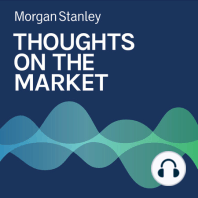3 min listen

Mike Wilson: Are Earnings Expectations Too High?
Mike Wilson: Are Earnings Expectations Too High?
ratings:
Length:
4 minutes
Released:
Oct 23, 2023
Format:
Podcast episode
Description
As investor sentiment recovers this month in anticipation of a strong year end, it’s important to acknowledge the factors that make this year’s fundamentals different.----- Transcript -----Welcome to Thoughts on the Market. I'm Mike Wilson, Chief Investment Officer and Chief U.S. Equity Strategist for Morgan Stanley. Along with my colleagues bringing you a variety of perspectives, I'll be talking about the latest trends in the financial marketplace. It's Monday, October 23rd at 10 a.m. in New York. So let's get after it. In our recent research, we’ve been arguing that the odds of a fourth quarter rally have fallen considerably. Our observations on narrowing breadth, cautious factor leadership, falling earnings revisions and fading consumer confidence tell a different story than the consensus view for a rally in the year end that's more centered on sentiment and seasonal tendencies. While we acknowledge that sentiment deteriorated in September, it's recovered this month on the expectation of seasonal strength in the year-end. In our view, the fundamental setup is different this year than normal, with earnings expectations likely too high for the fourth quarter and 2024. Meanwhile, both monetary and fiscal policy are unlikely to provide any relief and could tighten further. More specifically, while the Federal Reserve has not raised rates any further, it is likely far from cutting. Furthermore, the tightening the Fed has done over the past 18 months is just now starting to be felt across the economy. To that end, the stock market has taken notice with some of the more economic and interest rate sensitive sectors like autos, banks, transportation stocks, semiconductors, real estate and consumer durables significantly underperforming over the past three months. More recently, many defensive sectors and stocks have started to outperform with energy, which supports our late cycle view that the barbell of defensive growth plus late cycle cyclicals we've been recommending. In our view, this performance backdrop reflects a market that is incrementally more concerned about growth than higher interest rates. Even though the Fed has tightened monetary policy at the fastest rate in 40 years, it's confronted with sticky labor and inflation data that has prevented it from signaling a definitive end to the tightening cycle or when they will begin to ease policy. At the same time, the fiscal deficit has expanded to levels rarely seen with full employment. This is precisely why the Fed has indicated a higher for longer stance. In our view, the strength in the headline labor data masks the headwinds faced by the average company and household that the Fed can't proactively address. In addition to the performance deterioration and interest rate sensitive sectors, the breadth of the market continues to exhibit notable weakness. While some may interpret this as a bullish signal, meaning oversold conditions, we believe it's more a reflection of our longstanding view that we remain in a late cycle backdrop where earnings risk remain high. Further support for that view can be seen in earnings revision breadth, which is breaking lower again into negative territory. As another sign this negative revision breadth is an early warning for fourth quarter and 2024 earnings, stocks are trading very poorly post earnings reports whether they are good or bad. Third quarter earnings season is eliciting even weaker performance reactions than the 'sell the news' reaction during the second quarter earnings season. More specifically, the median next day price reaction is -1.6% thus far, versus -0.5% last quarter. We also note that the percentage of positive reactions is notably lower as well, at 38% versus 47% last quarter. With several of the megacap leaders reporting this week, this trend will need to reverse if the broader index is going to hold key tactical levels and rally in the year end as the consensus is now expecting. Instead, we think the S&P 500 price acti
Released:
Oct 23, 2023
Format:
Podcast episode
Titles in the series (100)
Mike Wilson: Are U.S. Economic Indicators Flashing Yellow? by Thoughts on the Market